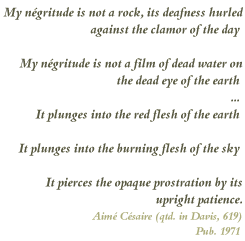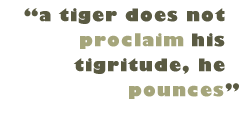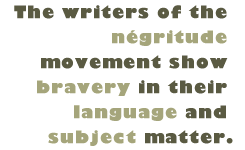Home-Art
329-GS 330-Lit 342-Hum 375-Com
385-GS 410-GS 450, Research-GS
450, Integration
|
|
|
Written by Jessica Albon |
|

|
On the other side of the negritude controversy, writers such as Wole Soyinka believe negritude belongs to "colonial ideology because it gives a defensive character to any African ideas" (Carlberg). Instead of contrasting African ways of life before colonialism with ways of life after, Soyinka focuses his energies on writing of worlds in which no one is good and no one is evil based merely on their land of origin. In his writing he encompasses "the imperfections of the past, which he accepts as inherent to the human condition and which he takes as an invitation to question the present" (Carlberg) instead of merely examining the effects of colonial injustice. Some critics also say that negritude does not do justice to the African experience because it is polarizing and delineates two experiences: the African experience and the European experience. Critics accuse negritude of preventing the African character from exhibiting characteristics other than rhythm and emotion. Critics also charge that negritude may lock Africa into an inflexible pattern of previous dynamics that does not allow individuals to forge their own identities and seek out their own destinies. There is concern that negritude ignores presently changing conditions in Africa (Senghor Web Enrichment). Opinions differ as to which writers can be classified as negritude writers, and which cannot. Soyinka seems to cause the most controversy as an active critic of negritude whose writing nevertheless displays characteristics of that very form. One source included him in their list of negritude writers (Davis), while another expressed confusion, and wrote, "Although Soyinka criticizes Negritude, his drawing on African myths, including those of his own Yoruba culture, does in fact define Negritude in its best sense" (Teisch). Other negritude writers are more easily identified and the individuals this essay will discuss are: Wole Soyinka, for those elements in his writing representative of negritude; Leopold Sedar Senghor; Nicolas Guillen; Aime Cesaire; Amiri Baraka; and Langston Hughes.
The swamp dwellers exhibit their reverence for the Serpent and the priest throughout the play, especially when Makuri says, "The land that we till and live on has been ours from the beginning of time. The bounds are marked by ageless iroko trees that have lived since the birth of the Serpent, since the birth of the world, since the start of time itself. What is ours is ours. But what belongs to the Serpent may never be taken from him" (Lim, 111). As a response to the blind beggar who has merely expressed his desire to cultivate land of his own, this seems harsh until one considers that they believe they live at the mercy of the Serpent. When one believes one's life depends upon being respectful, one responds in kind. |

|
The Serpent is a localized deity. The Yorubas have many divergent deities. "add to them [the differences] the incorporation into the Yoruba faith of facets of outside religions, particularly Christianity and Islam, and understanding the faith becomes difficult indeed" (Horton). While the family in the story is Muslim, they still have localized beliefs and these beliefs are respected and explored by Soyinka. The setting of Swamp Dwellers is also compelling. Traditionally those located in hard-to-reach areas are less impacted by the outside world. The swamp dwellers live at the end of the inhabitable portion of the river. No one would travel through their area on his/her way somewhere else. This isolates them in a way that protects their culture. Finally, the impact of colonization and the influence of cities is dealt with in a conversation between Igwezu and his father. Igwezu asks his father: "Tell me, father, is my brother a better man than I?" His father replies, "No, son. His heart is only more suited to the city" (Lim, 124). Soyinka is telling readers that some are destroyed by colonialism while others prosper, as in any other system. Though Soyinka is famous for saying, "a tiger does not proclaim his tigritude, he pounces. A tiger does not stand in the forest and say: 'I am a tiger.' When you pass where the tiger has walked,… you know that some tigritude has been emanated there…I was saying…that what one expected from poetry was an intrinsic poetic quality, not a mere-name dropping," his writing nonetheless encompasses many of negritude's characteristics (Soyinka Web Enrichment). Leopold Sedar Senghor is an intellectual, as are many of the negritude writers. He attended Lycee Louis le-Grand in France and was president of Senegal from 1960-1980. He "inaugurated the intellectual and artistic movement known as 'negritude'" (Lim, 145). As a negritude writer, he searched for the intrinsic reality and splendor of the Black experience and portrayed African life with dignity and jubilance. His "Prayer to Masks" exemplifies negritude in many ways. There is the obvious spirituality of the African culture in lines such as "Masks of the four points from which the Spirit blows" (Lim, 145). This line portrays the African culture as one with undeniable respect for the world around them. Africans create masks to represent their deities. Many of the native African religions are animistic in origin and represent individual natural occurrences as deities. It is interesting to note that masks figure into Soyinka's play as well, though there they take on a less spiritual role. The importance of spirituality and native religious values in negritude cannot be overemphasized as "the process of colonialism inflicted not only physical but also spiritual domination over young Africans who began to view their traditional poetry…as pagan" (Teisch). When Senghor writes, "You distill this air of eternity in which I breathe the air of my Fathers" (Lim, 146), he is relating that the masks purify his vision of the past generations, they allow him to see his heritage more clearly, and they also allow him to see the future. He sees himself in these masks. Negritude places extreme importance on history and culture and this importance is reflected in Senghor's poem. "Who give away their lives like the poor their last clothes," he writes meaning his people are strong and hold tight to their lives. They may be downtrodden, but they will not surrender. "Like the yeast which white flour needs," he writes, meaning that the Africans add to the Europeans (the flour). This follows through on the negritude ideal of Europeans and Africans as entirely separate entities, but both necessary. "Negritude proposes that there is an essentially African character and an essentially European character" (Senghor Web Enrichment). Finally, he writes, "For who would teach rhythm to a dead world of machines and /guns? /Who would give the cry of joy to wake the dead and the /bereaved at dawn?" He is telling the world that Africans have something to offer and he is also offering those African strengths to the static European world. It is apparent why Senghor is considered by many to be the father of negritude as his poem "Prayer to Masks," typical of his works, exemplifies the characteristics of the movement. |
|
|
Aime Cesaire is both "one of the world's leading black intellectuals" and a founder of negritude (Lim, 833). He wrote about the degradation caused by colonialism and slavery in "Out of Alien Days." With lines such as, "when /out of alien days /on reknotted shoulders will you sprout a head really your own" he makes his position on the subject of colonial control clear. Europeans, through the weight of slavery and colonialism, had robbed Africans of the ability to think on their own. He also wrote, "when /when will you cease to be the black toy /in the carnival of others /or in another's field /the obsolete scarecrow." These lines indicate that not only were Africans allowing themselves to be the playthings of the Europeans, but that the Europeans didn't even have a need for them any more (they have become obsolete), and yet they continue to serve the Europeans. The image created by the line, "under the salubrious plow of the storm," is one of a revolt. Plow can mean to strike with force and salubrious means conducive to well-being, so perhaps he believes this revolt (the storm) would be good for them; a revolt would drive them to sprout heads all their own. |
|
|

Baraka has taken the negritude movement a step further. Because Africans have gained a more acceptable identity in Western literature, they are bringing new cultural concerns to light, as Baraka does with his exposing of the violence inflicted upon Africans. Langston Hughes' father was an engineer and lawyer and though Hughes did not finish there, he attended Columbia University. "He was deeply involved in Negro life, which, as his writings show, he loved and thoroughly understood" (Lim, 964). Through his poem, "The Negro Speaks of Rivers," Hughes describes the history of Africans and how deeply rooted they are on the African continent versus their newness to the United States. He does this by referencing three rivers in Africa and only one in the United States and also by referencing the Mississippi in relatively recent times (Lincoln's presidency). "I've known rivers ancient as the world and older than the /flow of human blood in human veins. /My soul has grown deep like the rivers," he writes, showing his deep connection to the lands of his birth and the land of his ancestors. He uses rivers to achieve an almost timeless quality in his poem. Rivers can meander, seemingly forever, a constant element in the landscape. Interestingly, given the emphasis in the negritude movement on the rhythm and music of Africa, it is the Mississippi river that sings: "I heard the singing of the Mississippi when Abe Lincoln /went down to New Orleans." Hughes is bringing the rhythm and connection to nature from the African culture into the United States through his poetry. This again reflects the generosity seen in Senghor's poem and Guillen's poem. Hughes influenced Guillen greatly, as well as many other poets. His poetry reflects a reverence for African culture as well as a desire to tie it to the European/United States way of life. |
|
|
 he writers of the
negritude movement bravely write of their African heritages even though there are many
who would prefer they kept silent. As negritude has gained popularity, the writers have
stretched further to bring additional injustices to light. These writers all share a
common bond of being well-educated intellectuals who desired to publicize the African
experience and character. Though they face challenges in colonialism and slavery,
Africans refuse to be silenced. They bring the rhythm, allusions, and traditional
values of Africa to literature around the world. Each of these writers, in addition to
writing about the plight of his people, has been active politically, many have been
imprisoned or exiled because of their beliefs. This has strengthened their convictions
and fortified their desire to communicate the injustices done to their people. By using
literature to address these injustices, they create a movement known as negritude. he writers of the
negritude movement bravely write of their African heritages even though there are many
who would prefer they kept silent. As negritude has gained popularity, the writers have
stretched further to bring additional injustices to light. These writers all share a
common bond of being well-educated intellectuals who desired to publicize the African
experience and character. Though they face challenges in colonialism and slavery,
Africans refuse to be silenced. They bring the rhythm, allusions, and traditional
values of Africa to literature around the world. Each of these writers, in addition to
writing about the plight of his people, has been active politically, many have been
imprisoned or exiled because of their beliefs. This has strengthened their convictions
and fortified their desire to communicate the injustices done to their people. By using
literature to address these injustices, they create a movement known as negritude.
See Works Consulted |
 ole
Soyinka is a Nigerian writer whose work "remains deeply rooted in the Yoruba
culture of Nigeria" (Lim, 100). While he is a critic of negritude, his work also
exhibits the main characteristic of negritude: a deep-seated respect and understanding
for native culture. This respect is exhibited throughout the Swamp Dwellers, a play
written by Soyinka. When Igwezu's mother says, "I'm going to shout his name until
he hears me. I had another son before the mire drew him into the depths," (103),
she is speaking both literally and figuratively. While she does worry that her first
son may no longer be alive, she knows that even if he is, he is likely lost to her and
her culture.He has left his family behind to seek his fortune in the city and few young
men return after beginning such a journey. The second son has a stronger tie to the
land and so he does return to check on his crops (which have been ruined). The first
son became corrupted by the city (he stole his twin brother's wife and money), and
Igwezu's mother fears losing him as well.
ole
Soyinka is a Nigerian writer whose work "remains deeply rooted in the Yoruba
culture of Nigeria" (Lim, 100). While he is a critic of negritude, his work also
exhibits the main characteristic of negritude: a deep-seated respect and understanding
for native culture. This respect is exhibited throughout the Swamp Dwellers, a play
written by Soyinka. When Igwezu's mother says, "I'm going to shout his name until
he hears me. I had another son before the mire drew him into the depths," (103),
she is speaking both literally and figuratively. While she does worry that her first
son may no longer be alive, she knows that even if he is, he is likely lost to her and
her culture.He has left his family behind to seek his fortune in the city and few young
men return after beginning such a journey. The second son has a stronger tie to the
land and so he does return to check on his crops (which have been ruined). The first
son became corrupted by the city (he stole his twin brother's wife and money), and
Igwezu's mother fears losing him as well.

 onsidered
the most well known of the negritude writers, Nicolas Guillen creates his work from his
own Black experience, focusing on the daily life, racial inequalities, racial identity
and Black pride (Guillen Web Enrichment). In his poema-son "Can You?" Guillen
uses descriptive images that reflect respect for the natural world. Images such as
"the air /(not all of it) that sweeps /into your garden blossom on blossom,"
and "the sky that's blue at times, /or gray again at times," are unlike those
typically found in poetry created in the United States and Europe (which tends to focus
more on people than the natural world). He uses these serene natural images throughout
his critique on materialism and the capitalistic ways of life. There is a feeling of
tremendous history in this poem, particularly in the lines, "Can you sell me long
since buried jungles, birds now extinct, /fish fossilized, the sulphur /of volcanoes, a
thousand million years /rising in spiral?" His intimate knowledge of his region is
palpable. He knows where the jungles grew in the past, and he knows where the volcanoes
spewed sulphur millions of years ago. There is an all-encompasing sense to his images.
Similar to Senghor's poem, Guillen also displays a sense of generosity at the
conclusion of his poem when he writes, "The land that's yours is mine."
Guillen wrote of the depth of time and culture in his poetry. His highly visual and
sensory images have helped to make him one of the best-known writers of the negritude
movement.
onsidered
the most well known of the negritude writers, Nicolas Guillen creates his work from his
own Black experience, focusing on the daily life, racial inequalities, racial identity
and Black pride (Guillen Web Enrichment). In his poema-son "Can You?" Guillen
uses descriptive images that reflect respect for the natural world. Images such as
"the air /(not all of it) that sweeps /into your garden blossom on blossom,"
and "the sky that's blue at times, /or gray again at times," are unlike those
typically found in poetry created in the United States and Europe (which tends to focus
more on people than the natural world). He uses these serene natural images throughout
his critique on materialism and the capitalistic ways of life. There is a feeling of
tremendous history in this poem, particularly in the lines, "Can you sell me long
since buried jungles, birds now extinct, /fish fossilized, the sulphur /of volcanoes, a
thousand million years /rising in spiral?" His intimate knowledge of his region is
palpable. He knows where the jungles grew in the past, and he knows where the volcanoes
spewed sulphur millions of years ago. There is an all-encompasing sense to his images.
Similar to Senghor's poem, Guillen also displays a sense of generosity at the
conclusion of his poem when he writes, "The land that's yours is mine."
Guillen wrote of the depth of time and culture in his poetry. His highly visual and
sensory images have helped to make him one of the best-known writers of the negritude
movement.

 miri
Baraka attended both Rutgers and Howard University. Many of the negritude writers
attended prestigious universities and gained reputations for being highly intellectual.
They also all had strong political inclinations and worked to improve the situation of
Africans everywhere. Baraka shoulders the majority of the current negritude movement
through his poetry. He employs an unusual visual form in his poem "Real Song Is a
Dangerous Number." The poem is compact, without stanzas, and blocky without much
variation in line length. He also uses unusual contractions (yr and cd), which add to
the jarring visual image put forth by this poem. Baraka uses his poem to show readers
the violence of the African American experience. He writes of successful singers and
writers who have come to violent ends. He seems to believe this violence is almost
inevitable when he writes, "But I cd be /a poet name Larry Neal (or Henry Dumas)
/for the very same reason I cd also get kill" (Lim, 1095). Baraka writes with
rhythm, and acknowledges the tremendous power of rhythm, "The rhythm of yr image,
hotter than napalm." He compares the rhythm to a destructive chemical, perhaps
seeing this rhythm as destroying current social barriers. Baraka continues in the
tradition of negritude and Harlem Renaissance writers today. His writing is visually
different from that of "traditional" poets as he writes of the violence
inherent in the Black experience in the United States, giving a voice to that violence.
miri
Baraka attended both Rutgers and Howard University. Many of the negritude writers
attended prestigious universities and gained reputations for being highly intellectual.
They also all had strong political inclinations and worked to improve the situation of
Africans everywhere. Baraka shoulders the majority of the current negritude movement
through his poetry. He employs an unusual visual form in his poem "Real Song Is a
Dangerous Number." The poem is compact, without stanzas, and blocky without much
variation in line length. He also uses unusual contractions (yr and cd), which add to
the jarring visual image put forth by this poem. Baraka uses his poem to show readers
the violence of the African American experience. He writes of successful singers and
writers who have come to violent ends. He seems to believe this violence is almost
inevitable when he writes, "But I cd be /a poet name Larry Neal (or Henry Dumas)
/for the very same reason I cd also get kill" (Lim, 1095). Baraka writes with
rhythm, and acknowledges the tremendous power of rhythm, "The rhythm of yr image,
hotter than napalm." He compares the rhythm to a destructive chemical, perhaps
seeing this rhythm as destroying current social barriers. Baraka continues in the
tradition of negritude and Harlem Renaissance writers today. His writing is visually
different from that of "traditional" poets as he writes of the violence
inherent in the Black experience in the United States, giving a voice to that violence.
